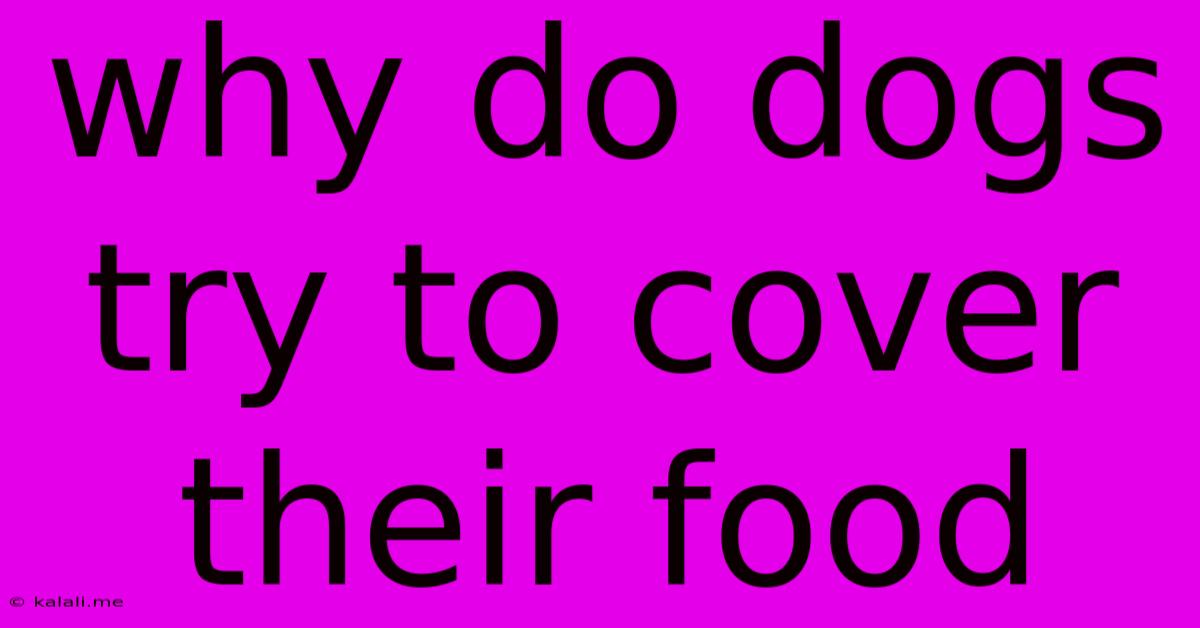Why Do Dogs Try To Cover Their Food
Kalali
May 23, 2025 · 3 min read

Table of Contents
Why Do Dogs Try to Cover Their Food? Uncovering the Canine Curiosity
Have you ever watched your furry friend meticulously bury their kibble, push their bowl under the sofa, or even try to drag a tasty treat under the rug? This seemingly strange behavior is more common than you might think, and it's rooted in a fascinating mix of instinct and learned behavior. Understanding why dogs cover their food gives us valuable insight into their canine minds.
This article delves into the multiple reasons behind this intriguing behavior, exploring the evolutionary roots, individual dog personalities, and potential training implications. Let's uncover the secrets behind why your dog might be trying to hide their dinner.
The Evolutionary Roots: Instinctive Behavior
For millennia, dogs' ancestors, wolves, had to actively hunt and scavenge for food. Food sources were unpredictable, and competition for resources was fierce. To ensure their survival, wolves developed an instinct to cache, or hide, their food. This prevented other animals from stealing their hard-earned meal and ensured they had something to eat later.
This innate instinct is deeply ingrained in many dogs today, even those who enjoy a consistently filled food bowl. The act of burying or covering their food taps into this ancient survival mechanism, even if they're not facing any real threat of food scarcity.
Individual Dog Personalities and Learned Behaviors
While instinct plays a significant role, a dog's personality and past experiences also contribute to their food-covering habits.
- Insecurity and Resource Guarding: Some dogs might cover their food out of a sense of insecurity, particularly if they've experienced food deprivation or competition with other animals in the past. This act can be a form of resource guarding, ensuring that only they have access to their precious meal.
- Anxiety and Stress: Anxiety can manifest in various ways, and food-covering can be one of them. A stressed or anxious dog might try to secure their food as a coping mechanism, providing a sense of control in an otherwise unpredictable environment.
- Learned Behavior: If a dog has successfully hidden food in the past and avoided unwanted attention or competition, they might repeat the behavior. This reinforces the action as a positive experience, increasing the likelihood of them continuing this habit.
- Playing and Exploration: In some cases, particularly in playful puppies, food covering can be a playful exploration of their environment. They might simply be experimenting with their surroundings and manipulating objects, with the food acting as an accidental tool in this game.
Breed Predisposition?
While not definitively proven, some breeds might exhibit a greater tendency towards food-covering than others. Breeds with strong hunting or herding instincts, those bred for independent foraging, might demonstrate a stronger connection to this ancestral behavior. However, this is highly variable, and individual personalities trump breed-specific predispositions.
What to Do About It?
If your dog's food-covering behavior is causing problems – such as messes, spoiled food, or anxiety – you can take several steps:
- Ensure Consistent Food Access: Regular feeding times and a consistently full food bowl can help alleviate insecurity around food scarcity.
- Create a Calm and Secure Environment: Minimize stress-inducing factors in the home, providing your dog with a safe and comfortable space to eat.
- Positive Reinforcement Training: Reward your dog for calmly eating their food in their designated area without attempting to bury or hide it. Positive reinforcement, like treats and praise, is more effective than punishment.
- Consult a Veterinarian or Professional Dog Trainer: If the behavior is excessive, persistent, or accompanied by other signs of anxiety or stress, consulting a professional is advisable. They can help determine the underlying cause and develop an appropriate behavioral modification plan.
In conclusion, dogs covering their food is a complex behavior with deep evolutionary roots, intertwined with individual personalities and learned experiences. Understanding the nuances behind this action allows us to better connect with our canine companions and address any potential underlying issues, creating a happier and healthier environment for everyone.
Latest Posts
Latest Posts
-
Power Up Radio Transmitter Fallout 4
May 24, 2025
-
Getting Flowers 2 Days Before Giving Them
May 24, 2025
-
Pass Argument Ti A Function In Ksh
May 24, 2025
-
How Old Was Harry When His Parents Died
May 24, 2025
-
100 Amp Sub Panel Wiring Diagram
May 24, 2025
Related Post
Thank you for visiting our website which covers about Why Do Dogs Try To Cover Their Food . We hope the information provided has been useful to you. Feel free to contact us if you have any questions or need further assistance. See you next time and don't miss to bookmark.